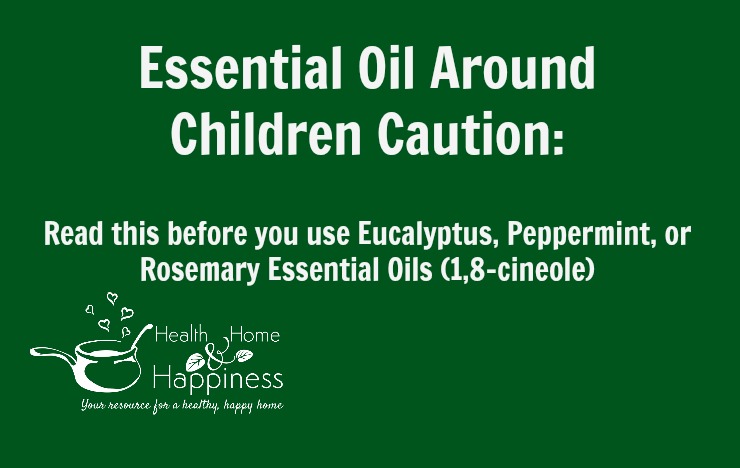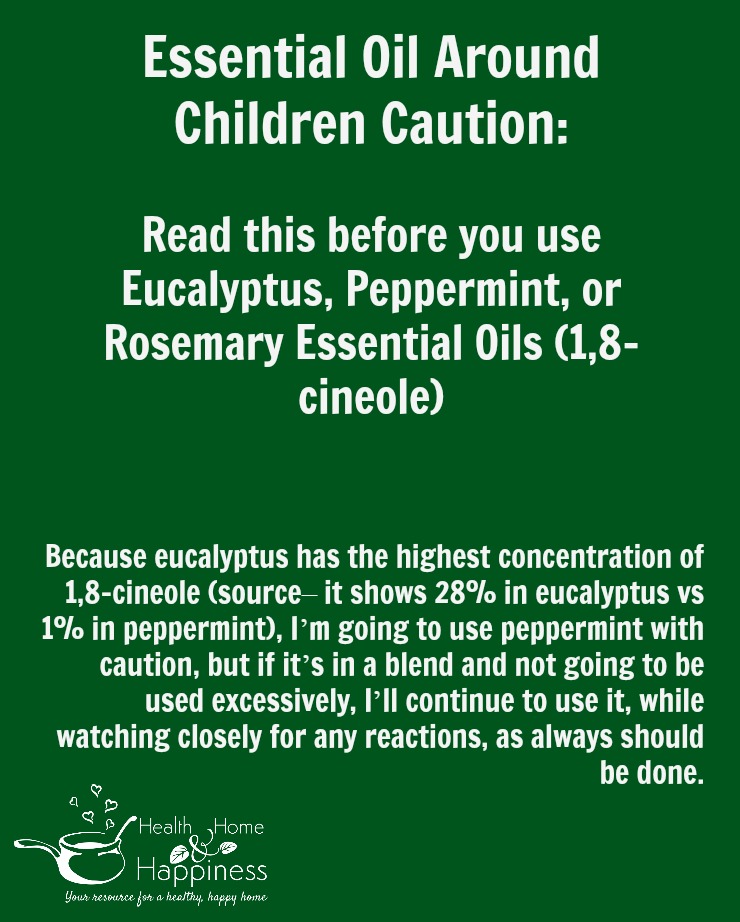
1,8-cineole, a compound found in Eucalyptus, peppermint, and rosemary (and possibly others, these are the ones I’ve heard of though), is referenced by some bloggers to cause slow breathing and possibly even stop breathing in infants. Scary stuff! The last thing we want to do is cause respiratory problems by using essential oils. The goal with essential oils is to promote wellness, and use them to solve health problems that aren’t caused by a needed diet change or unhealthy lifestyles. Essential oils can be a powerful healing tool, but they also are a very very concentrated part of the plant. Anything in a high concentration is more likely to cause problems, at the same time, the high concentration is what makes these effective medicines.
Looking at Claims
Before I listen to any claims on ‘oh, it’s safe, I’ve always used it for my children’ or ‘no, it’s absolutely not safe because it contains 1,8-cineole’ I want to look for actual studies, and make an educated decision off of that. More leeway can be given to things that have been used for hundreds or thousands of years, I believe, because there has been more time for issues to surface and be warned about. But I’m willing to bet that 100 years ago Grandma wasn’t using a diffuser to diffuse a bottle of concentrated oil into the air for her infants to breathe. She was, however, giving her children cod liver oil- I can get behind that, for sure.
But *my brand of oil* is super pure
When we’re looking at 1,8-cineole the issue isn’t the purity – this is a naturally occurring substance within the plants that the oils are derived from. The substance itself is the problem. Just like caffeine is naturally found in tea and coffee, even a very pure extract of green tea with no additives will still contain a bunch of caffeine. That doesn’t mean that it’s a good thing to give to our children.
Studies
I was first told about the dangers of eucalyptus oil with children in the group Using Essential Oils Safety, see this article. I wanted to do more research and read some studies, rather than just rely on ‘this person said it’s safe’ or ‘that person said it’s dangerous’.
A web search of 1,8-cineole reveals lots of documented studies. The compound is said to be found mostly in eucalyptus, but also in peppermint, ginger, basil, rosemary, sage, and cardamon (source). It has shown to be effective at reducing inflammation in the lungs (source), helping therapeutically with asthma (source), bronchitis (source) and helping with a sinusitis (source). See? Essential oils are a great thing to have in your medicine cabinet, but they also are *medicinal* and not to be used without consideration.
This article talks about how lethal dose (orally) of eucalyptus oil in mice produced similar symptoms of an overdose of topical eucalyptus oil in a 6-year-old girl being treated for hives (source) with a topical preparation.
This study looks at incidences of accidental eucalyptus oil ingestion (usually in the form of vaporizer liquid) and states, “ingestion of eucalyptus oil caused significant morbidity in infants and young children. Significant depression of conscious state should be anticipated after ingestion of 5 mL or more of 100% oil. Minor depression of consciousness may occur after 2-3 mL. Airway protection should precede gastric lavage.”

In our family
To put the above study in perspective, 1/4 teaspoon is one mL, so that’s not an insignificant amount of oil, but the symptoms are severe and alarming, and not something I’m comfortable with messing around with.
Some of the blends have eucalyptus in them, and where I have used them in the past with my kids, I will now skip eucalyptus in the diffuser around the baby, unless we are hanging onto a cold or cough even with the use of alternative oils, and could use the documented medicinal qualities of eucalyptus.
Because eucalyptus has the highest concentration of 1,8-cineole (source– it shows 28% in eucalyptus vs 1% in peppermint), I’m going to use peppermint with caution, but if it’s in a blend and not going to be used excessively, I’ll continue to use it, while watching closely for any reactions, as always should be done.
Some oils that can clear congestion and relieve coughing that don’t have 1,8-cineole:
Original article and pictures take healthhomeandhappiness.com site
Комментариев нет:
Отправить комментарий